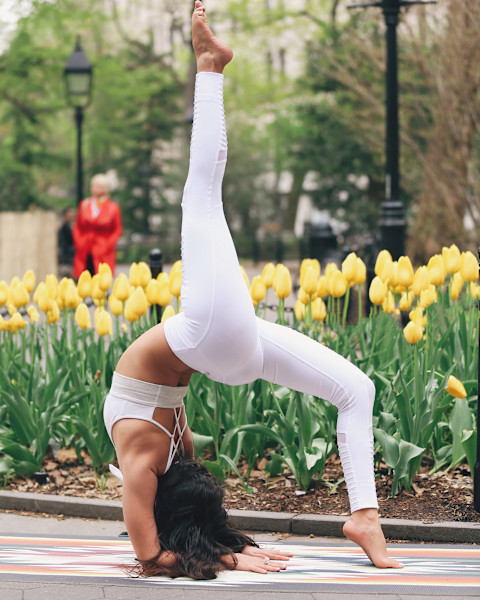5 Ways Getting Upside Down Every Day Benefits Your Mental & Physical Health
Many hear the word "inversion" and think “headstand, handstand...ah!" But an inversion can be as simple as a downward-facing dog—really!
Now that you're feeling less intimidated by the idea of inversions, let's talk about why getting upside down (or at least sort of upside down) is so important.
Here are five reasons you should do inversions every single day:

1. Inversions help with focus, balance, and brain function.
When you hang upside down, oxygen-rich blood flows to your brain. After you adjust to it you begin to notice that your brain feels more alive. Since your brain is the largest consumer of oxygen in your body, more blood means more oxygen, which means better brain function. When I'm upside down, I'm my most focused. I am working every part of my body, while also trying to stay calm—luckily, inversions force you to relax focus and adjust yourself to that current situation.
2. Inversions are great for the four main systems of the body.
Yep, it's true: Inversions positively influence the cardiovascular, lymphatic, nervous, and endocrine systems.
3. Inversions reverse the harmful effects of gravity.
For that reason, inversions are one of the most effective treatments for back issues and load-bearing joint issues. As someone who is always in motion (or helping those in motion), I find that getting the chance to go upside down is an easy and helpful way for me to reduce stress. I love backbends, but I often find that I need to be upright—and by upright I mean upside-down upright.
Bending is fun, but it's really mentally and physically straining. When I go for straight alignment, I feel so much more grounded. My mind and body fully connect, which I always find extremely gratifying.
4. Inversions reduce mental stress and defy the aging process.
With the constant stress of life, we have to make sure to take time to let go of what is unwanted in our bodies— and inverting is just another helpful tool to relax the mind.
5. Inversions strengthen the immune system and mind.
Let's be honest: Green juices and ginger shots are great, but it's also really amazing to know our own bodies are capable of fixing themselves. When it comes to improving the mind, so much discipline comes with inversions. I am personally just starting to feel comfortable jumping into my forearm stand, but when I mean jumping I mean my mind is working.
I know what I am about to do, I know that my core must be engaged, my thorax is working, my arms and legs need to be fully engaged, my gaze has to be right—there's a lot going through my mind. I am fully thinking about what I'm doing with my body—it does not come naturally!
New to inversions? Don't be intimidated! Know that an inversion does not mean you need to do a crazy handstand—it can really be a simple downward-facing dog. I promise you, you will feel the benefits. Look at beginner inversions, start there, move toward a goal you feel you want, and make that your inversion of the day. It's so important to love what you are doing, so once you feel comfortable with yourself upside down, explore the variety of asanas.

